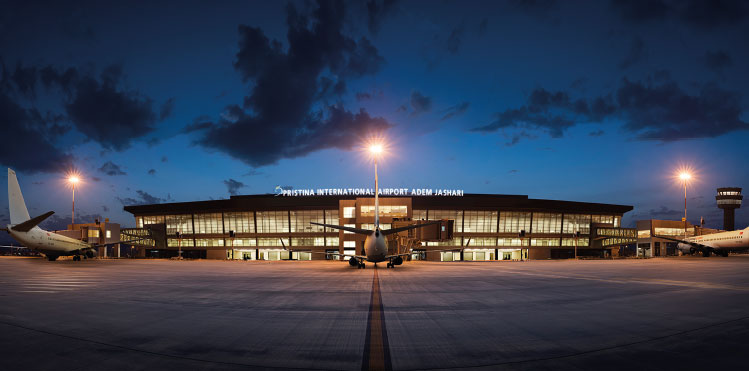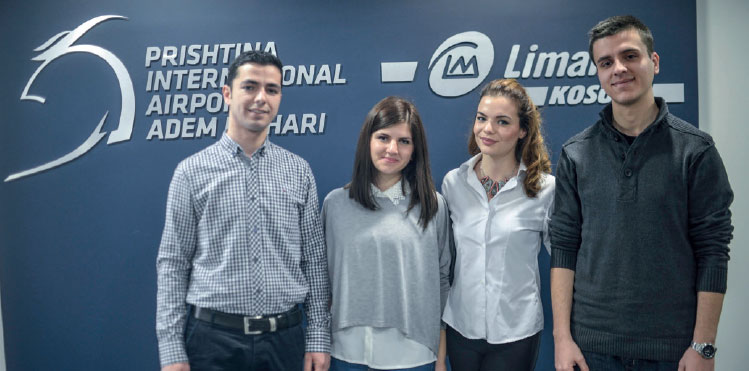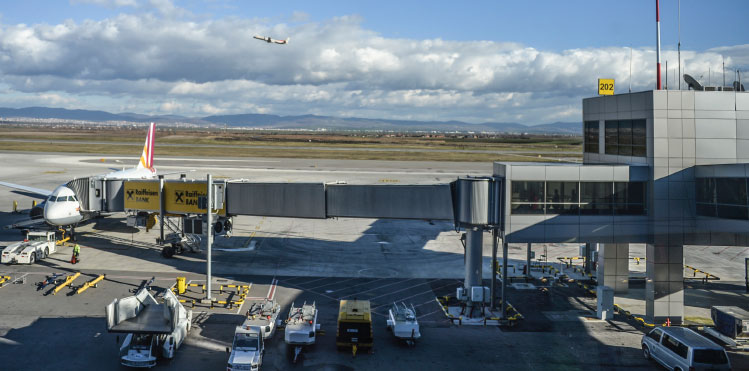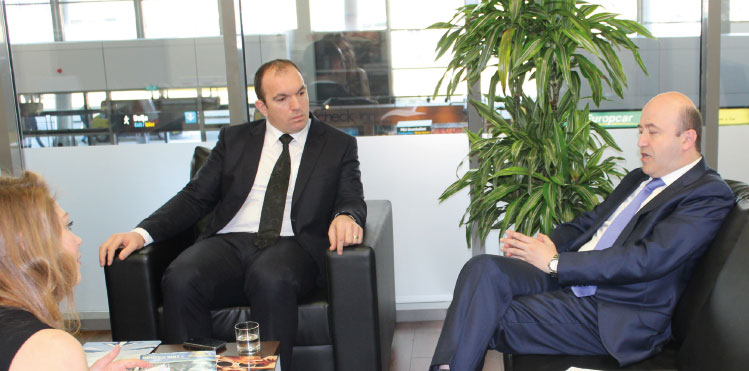The period leading up to the independence of the Republic of Kosovo was a time fraught with difficulty for its people. Seven years on, the dynamic young country is flourishing – its development led by the construction of the new Prishtina International Airport Adem Jashari. Haldun Fırat Köktürk, CEO, Limak Kosovo Airport, explained to Amy Hanna that with the landmark opening of the gateway, Kosovo is putting forth the message that it is ‘Ready for the World’.
The opening of Prishtina International Airport Adem Jashari was a defining moment in the lives of the citizens of Kosovo. Hundreds of people flocked to the new terminal to witness the Prime Ministers of Kosovo, Albania and Turkey cut the inauguration ribbon in October 2013 – and welcomed the first flight with tears of elation. For the establishment of the airport was a landmark event in the growth of the country.

As an airport concession, Prishtina International Airport Adem Jashari is considered to be among the most successful in the Balkans, having so far satisfied all of the goals and objectives set for it by the government, and achieving on-time performance figures of 99.5%.
The most important infrastructural development in the Republic of Kosovo since the declaration of its independence in 2008, it is the only international gateway, and its opening has been deemed the second most significant day in the history of Kosovo since it became an autonomous nation. In the eyes of Kosovans it serves as a prominent symbol of its newfound liberty, of new freedoms, and of the prosperous future of the dynamic young state.
Connecting Kosovo with the world
A consortium of Turkish corporation Limak Kosovo Airport and Aéroports de Lyon took on the management and operation of the airport in 2011, and began developing the state-of-the-art €140 million terminal. It has the capacity to handle 3.2 million passengers, and the potential to be expanded to handle the 4.5 million annual passengers forecast by the end of the consortium’s 20-year concession period.
Far removed from the nation’s previous air terminal, the 42,000sqm new airport is a spacious, modern and efficient facility with new apron stands, four air bridges, and a large departures hall and ample car parking suited to the needs of the close-knit Kosovan community. The airport also features passenger processing technologies rarely before seen by Kosovan travellers, who saw with the construction of the airport developments not only in concrete and steel, but in the mindset of the nation.
“The period leading to the country’s independence was challenging, and there have been some very difficult and very sad times in Kosovo’s recent history. War is a horrible thing. But now, Kosovo is ready to penetrate the international community,” said Haldun Fırat Köktürk, CEO of Limak Kosovo Airport. “With this facility, we have proved that as a society, that we also belong to – the Kosovan society – we are ready for the world.”
Having begun his career as an engineer with Limak in its operation of Istanbul Sabiha Gökçen Airport, Köktürk pioneered the development of Prishtina International, instilling within it experience gained at the heart of the booming aviation industry in Turkey. “As the Limak group of companies we have a lot of business, and projects that amount to billions of dollars, so this is not our biggest project,” he said. “But this is a crucially important endeavour for us. Because it means a lot to Kosovans.”
Prishtina International Airport Adem Jashari serves as a bridge connecting Kosovo to Europe and the rest of the world – and provides an important gateway to the Balkan region. “Having safe and secure services offered to airlines and passengers undoubtedly increases the image of Kosovo as a safe country, and creates possibilities for economic growth,” Köktürk stressed. “We believe you see Kosovo at its best upon landing – a warm, active and friendly country with developing infrastructure.”
The new gateway has created a wealth of opportunity for the country to connect to a diverse variety of destinations, and will serve as a platform for the development of tourism in Kosovo and beyond.
The changing face of Kosovo
Limak Kosovo Airport operates in a Public-Private Partnership with the Kosovo Government, and its success has started ripples of change within the nation. Development in Kosovo was for some time impeded by the impact of the civil war – the finance sector’s capability is narrow, and private investment in the country’s infrastructure has not been historically strong. Köktürk explained that the airport’s position as one of the most important assets in the country’s progression is serving as a catalyst, encouraging external investment into the region. “Kosovo depends heavily on foreign investors for its development,” he said. “From that perspective the airport is definitely important, because it demonstrates success in a project that has been financed by a foreign investor. As an emerging country, Kosovo has many opportunities.” The growth of aviation is triggering much-needed income into Kosovo, and as such touristic investment is the forefront of its development. Recognising the potential of public-private investment a PPP formed between the Kosovo Government and a French consortium is investing €410 million into a ski resort in Kosovo’s spectacular Brezovica mountains.
In Kosovo’s cities however investment still is desperately needed to create a hotel and leisure infrastructure that can keep pace with the growth of passenger numbers. Though the capital Prishtina and its surrounding communities are developing with great momentum, few buildings yet match the airport in modernity. The airport, though, is aware of its privilege, and takes its corporate social responsibility very seriously. The prosperity of the Kosovan people is interwoven with its business, and as well as providing water from the on-airport treatment plant to neighbouring villages, Limak Kosovo Airport is addressing one of Kosovo’s most prevalent problems – the widespread unemployment that impacts upon roughly 45% of its young population.

The Limak Airport Services Institute supports students of the University of Prishtina by creating solid employment prospects within the airport, and is the first corporation pioneering the transformation of the traditional employment model in Kosovo. “We have wonderful opportunities here at the airport, and it is a great new world that before we applied for the programme we didn’t know existed,” explained Arlinda Bresa, a student of the University of Prishtina Faculty of Mechanical Engineering.
“We strive to build a strong community,” Köktürk said. “We feel an intense obligation to encourage the youth towards a promising future, and that’s why we decided to take the first step with the Limak Airport Services Institute. LimakASI aims to support local students to further develop their academic and professional skills as well as their business knowledge.” In cooperation with professors of Istanbul Boğaziçi University, the airport is providing practical and academic training to 30 students selected from five faculties of the University of Prishtina. The LimakASI programme has created a unique opportunity for the youth of Kosovo and, moreover, initiated a brand new model for employment within the country, which values knowledge and achievement over the familial ties on which employment in Kosovo has historically been based.
“I think this programme will be used as an example for other companies to see the capacity that the youth of Kosovo has,” explained Arlinda Bresa, a student of the University of Prishtina. “The airport is the leader of a whole new education system. They all are going to follow this example and that will be a great thing for Kosovo.” By the end of April the first students will attain a qualification recognised by airports in more than 70 countries, and an unparalleled understanding of the air transport industry that is unfamiliar to many people in the young Republic. For many of the students the programme presents the first opportunity to work abroad, and they are aware of the importance of drawing on international experience to bring their new learning home to Kosovo. “This country needs new and trained employees. We have to work to enhance the quality of life in Kosovo – to raise the standards,” Bresa said.
In the coming weeks the programme will take the students to experience the operations of Sabiha Gökçen and Lyon-Saint Exupéry airports – for many, their first experience of air travel. At present the average income of the Kosovan people remains modest, limiting their travel opportunities. Visa limitations too mean that Prishtina International Airport’s traffic is largely one-way – around 70% composed of the Kosovan diaspora living in Switzerland and Germany. It is hoped that visa liberalisation for Kosovans in Schengen countries will come into force in the next year or so, and with it, a dramatic change to Kosovo’s aviation climate. “Visa liberalisation will make a significant impact – and with the development of air transport facilities we think also that the GDP will increase,” Köktürk furthered. “With this increment the government is planning to make some changes to the income of civil servants, which will have a positive effect on the average income. The people in Kosovo are young, they like to travel, and when they have a chance they will.”
The dynamic air transport environment
Change has been abounding in Kosovo’s air transport environment since the airport’s establishment. In 2013 the collapse of Belle Air Europe – which used to handle around 470,000 passengers and close to 30% of the airport’s traffic – impacted considerably on its throughput, but impressive passenger growth in 2014 has continued into this year with a 12.5% year-on-year increase in January and 8% in February – and is expected to persist as 2015 goes on.

The development of its route network, Slot Coordinator Driton Hyseni explained, is an important priority for the airport, and it will, for 2015, be implementing a new incentives programme for its airlines.
Swiss International and Adria Airways are increasing frequencies, while Germania will soon add Bergamo to the destinations it serves from Prishtina, and enter into the Swiss market for the first time with thrice-weekly summer services. The development of its route network, Slot Coordinator Driton Hyseni explained, is an important priority for the airport and it will, for 2015, be implementing a new incentives programme for its airlines. But Prishtina is currently facing challenges presented by the direct incentives being provided by the government of nearby Macedonia to its airlines, and Kosovo Civil Aviation Authorities are awaiting the result of a European Commission investigation into the fairness of the programme. “We as an airport operator can compete with another airport operator – competition is normal, it is good,” Köktürk said. “But we cannot compete with a government. If the European Commission tells the Macedonia Government that these incentives are permitted then we will approach the Kosovo Government to say, if the Macedonia Government is doing this – can we do the same?”

Driton Hyseni, Slot Coordinator, Prishtina International Airport Adem Jashari, and Haldun Fırat Köktürk, CEO of Limak Kosovo Airport. “As the Limak group of companies we have a lot of business and projects that amount to billions of dollars, so this is not our biggest project,” Köktürk said. “But this is a crucially important endeavour for us. Because it means a lot to Kosovans.”
“In this competitive environment,” Hyseni added, “we cannot catch significant growth without the support of the government. We can do our best with incentives, but in the end the government has to support it.”
Meanwhile, discussions are presently taking place between the Kosovan and Serbian governments regarding the normalisation of airspace usage and the recommencement of flights between Prishtina and Belgrade. It is hoped that in the coming years Air Serbia will begin services between the two nations for the first time since Kosovo’s independence. “Both countries have targets to join the EU, and this will give a good signal that our two nations are leaving the past behind, and looking for a better future,” Hyseni said.
As the newly independent nation progresses, regulatory, social and economic developments continue to transform the aviation industry of Kosovo – as well as the potential of Prishtina International Airport and its impact on the lives of the Kosovan people.







